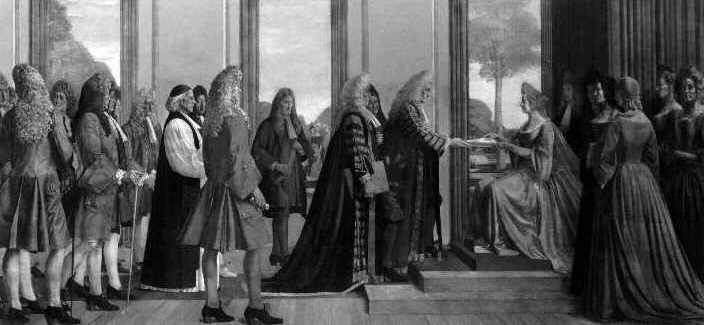
The Acts of Union were two Acts of Parliament passed in 1707 by the Parliament of England and the Parliament of Scotland. The acts were the implementation of the Treaty of Union negotiated between the two kingdoms. The effect of the Acts was twofold:
§ to create a new state, the Kingdom of Great Britain, although the name had been used on occasion since 1603 when speaking of the Kingdoms of England and Scotland together, which had shared a monarch from that date but retained sovereign parliaments. Wales was also part of Great Britain since it had been annexed by England by the Laws in Wales Acts 1535-1542.
§ to dissolve both parliaments and replace them with a new Parliament of Great Britain (known as the Union of the Parliaments). The new parliament was to be based in the former home of the English Parliament.
This painting hangs in the Palace of
Westminster, depicting the official presentation of the law that formed the
Kingdom of Great Britain (Queen Anne is about to sign the Acts of Union)

In the English case, the purpose was to establish the Royal succession along
Protestant lines. The two countries had shared a king for much of the previous
century. The English were now concerned that an independent Scotland with a
different king, even if he were a Protestant, might make alliances against
England.
In the Scottish case, the purpose was partly to use English subsidies to recover
from the financial problems and partly to remove English trade sanctions.
In the period following the Act of Union 1707 Scotland's place in the world altered radically. Arguably the poorest country in western Europe in 1707, it was now able to turn its attentions to the wider world without the opposition of England. Scotland reaped the economic benefits of free trade within the British Empire together with the intellectual benefits of having established Europe's first public education system since classical times.
credits:
The text was extracted from Wikipedia The Free Encyclopedia under GNU Free Documentation Licence.